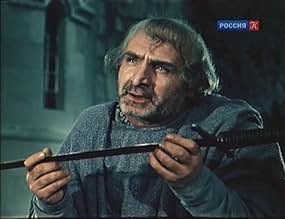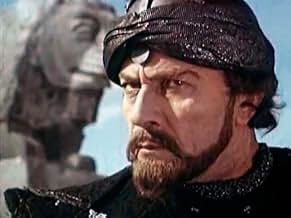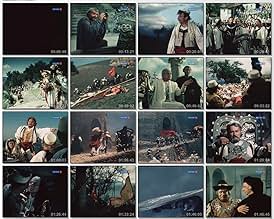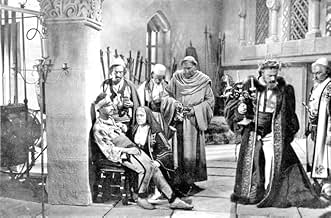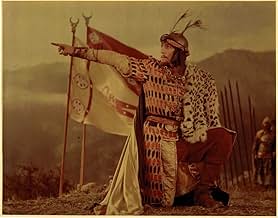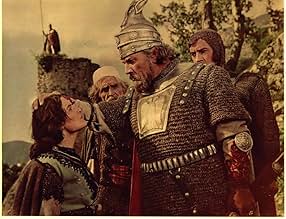VALUTAZIONE IMDb
7,7/10
832
LA TUA VALUTAZIONE
La vera storia dell'Eroe Nazionale degli Albanesi, George Kastrioti Scanderbeg, dalla sua nascita nel 1405, alla sua morte nel 1468.La vera storia dell'Eroe Nazionale degli Albanesi, George Kastrioti Scanderbeg, dalla sua nascita nel 1405, alla sua morte nel 1468.La vera storia dell'Eroe Nazionale degli Albanesi, George Kastrioti Scanderbeg, dalla sua nascita nel 1405, alla sua morte nel 1468.
- Regia
- Sceneggiatura
- Star
- Premi
- 2 vittorie e 1 candidatura in totale
Veriko Anjaparidze
- Dafina
- (as Veriko Andjaparidze)
Recensioni in evidenza
This movie is a great one. Unlike "Troy" or "Alexander" this one has its own goods. There are the scene fights, small love lines, and magic if you ask me. This historic movie about the Albanian hero "Skenderbeu" is what a family movie should be about. Is educational and not very violent, and as far as my opinion I think of it as a PG-13 movie. Would be great if Hollywood creates a version of this movie, I, my self believe it wold be great to experience something with the great technology at hand now and compare it with the 1970's version of this movie. There is anything about this movie that all the other movies should have, meaning. There is clearly a very good history line behind this movie. Starting in the beginning with a abduction of the Albanian brethren to the day when "Skenderbeu" betrays the Turks and gets back to its place, Albania.
One of the most beautiful old movies with national heroes. The true story of Skanderbeg who stopped the Ottomans from crossing into Europe for more than 25 years. A beautifully made film for the time and great soundtracks.
10dermaku
i already watch this movie more than three times and every time i watch it in the end i was always thinking the same thing wow this movie is fantastic i like this true history like the middle age war and the strategy that is used in this period of time is fantastic Albania is proud to have soldier like Gjergj Kastrioti and plenty plenty great soldier and bed thing about it is because movie is too old and need a remake to be even better to know this generation what a great warrior use to be Gjergj Kastriot a.k.a Skenderbeg, glad to watch this movie from 1953 such a grateful and strong history from great name and soldier it will be even better if we see soon the new movie with the same history
Gjergj Kastrioti Skënderbeu is national hero of us and we're very thankful to all that made this film possible. The successor of Alexander of Macedon and Phyrrus of Epirus, Skënderbeu returned to his forefathers land to led the battels for freedom against the Ottomans. I'm grandson of two great-grandfathers who fought against the Greek chauvinists in southern Albania (Epir that means E Pirros) and they've fallen to protect Albania.
To end this write, I have to say that Albania will never be in the hands of the invaders and we will get our lands back again!
This movie i saw as kid in Albania many years ago and still it make me spell bound with its fabulous dance moments which are amazing knowing this is a 1953 production so much better that today Bollywood crap. Skanderbeg was a hero of Albania and Mel Gibson should do a new version of this movie which will make William Walace(BraveHeart)LOOK LIKE A CHICKEN FARMER IN Scotland. In today day and age having an Albanian 1953 color picture is a true blessing.Yes the acting may seem and look bit outdated and wooden but the fact remain that Russian touch has helped Skanderbek shine and for my liking this is a CLASSIC... Here is some historical facts about George Kastrioti nicknamed in honor of Alexander The Great Skander and title Beg. Gjergj (Albanian: George) Kastrioti was born in Kruja from Gjon Kastrioti, lord of Middle Albania, who was obliged by the Ottomans to pay tribute to the Empire. To assure the fidelity of local rulers the Sultan used to take their sons as hostage and bring them up in his court. Gjergj Kastrioti attended military school in the Ottoman Empire and was named Iskander Bey which in Turkish means Lord Alexandre.
He was distinguished as one of the best officers in several Ottoman campaigns both in Asia Minor and in Europe, and the Sultan appointed him General. He even fought against Greeks, Serbs and Hungarians, and some sources says that he used to maintain secret links with Raguse, Venice, Vladislas of Hungary et Alphonse V of Naples. Sultan Murat II gave him the title Vali which made him the General Governor of some provinces in central Albania. He was respected everywhere but he missed his country.
In 1443, during the battle against the Hungarians of Hunyadi in Nish (in present day Serbia), he abandoned the Ottoman Army and captured Kruja, his father's seat in middle Albania. Above the castle he rose the Albanian flag, a red flag with the black double-headed eagle, the present-day Albanian flag, and pronounced to his countrymen the famous words: "I have not brought you liberty, I found it here, among you". He managed to unite all Albanian princes at the town of Lezha (League of Lezha, 1444) and united them under his command to fight against the Turks.
During the next 25 years he fought, with forces rarely exceeding 20,000 against the most powerful army of that time and defeated it for 25 years. In 1450 the Turkish army was led by the Sultan Murad II in person, who died after his defeat in the way back. Two other times, in 1466 and 1467, Mehmed II, the conqueror of Constantinople, led the Turkish army himself against Skenderbeg and failed too. The Ottoman Empire attempted to conquer Kruja 24 times and failed all 24 of them.
Skenderbeg's military successes evoked a good deal of interest and admiration of the Papal state, Venice and Naples, themselves threatened by the growing Ottoman power across the Adriatic. The Albanian warrior played his hand with a good deal of political and diplomatic skill in his dealings with the three Italian states. Hoping to strengthen and expand the last Christian bridgehead in the Balkans, they provided Skenderbeg with money, supplies and occasionally with troops. One of his most powerful and consistent supporters was Alfonso the Magnanimous (1416-1458), the Aragone king of Naples, who decided to take Skenderbeg under his protection as vassal in 1451, shortly after the latter had scored his second victory against Murad II. In addition to financial assistance, the King of Naples undertook to supply the Albanian leader with troops, military equipment as well as with sanctuary for himself and his family if such a need should arise.As an active defender of the Christian cause in the Balkans, Skenderbeg was also closely involved with the politics of four Popes, one of them being Pius II (1458-1464) or Aeneas Sylvius Piccolomini, the Renaissance humanist, writer and diplomat.
Profoundly shaken by the fall of Constantinople in 1453, Pius II tried to organise a new crusade against the Turks; consequently he did his best to come to Skenderbeg's aid, as two of his predecessors Nicholas V and Calixtus III, had done before him. This policy was continued by his successor, Paul II,(1464-1473).They gave him the title Athleta Christi.
For a quarter of a century he and his country prevented Turks from invading Catholic Western Europe.
After his death from natural causes in 1468 in Lezha, his soldiers resisted the Turks for the next 12 years. In 1480 Albania was finally conquered by the Ottoman Empire. When the Turks found the grave of Skenderbeg in Saint Nicholas church of Lezha, they opened it and held his bones like talismans for luck. In 1480 the Turks invaded Italy and conquered the City of Otranto.
Skenderbeg's posthumous renown was by no means confined to his own country. Voltaire thought the Byzantine Empire would have survived had it possessed a leader of his quality. A number of poets and composers have also drawn inspiration from his military career. The French sixteenth-century poet Ronsard wrote a poem about him and so did the nineteenth-century American poet Longfellow. Antonio Vivaldi, too, composed an opera entitled Scanderbeg.
Skenderbeg today is the National Hero of Albania. Many museums and monuments are raised in his honour around Albania, and among them the Museum of Skenderbeg in his famous castle in Kruja.
Bibliography: Noli, Fan S.: George Castrioti Scanderbeg, New York, 1947 Logoreci, Anton: The Albanians, London, 1977
He was distinguished as one of the best officers in several Ottoman campaigns both in Asia Minor and in Europe, and the Sultan appointed him General. He even fought against Greeks, Serbs and Hungarians, and some sources says that he used to maintain secret links with Raguse, Venice, Vladislas of Hungary et Alphonse V of Naples. Sultan Murat II gave him the title Vali which made him the General Governor of some provinces in central Albania. He was respected everywhere but he missed his country.
In 1443, during the battle against the Hungarians of Hunyadi in Nish (in present day Serbia), he abandoned the Ottoman Army and captured Kruja, his father's seat in middle Albania. Above the castle he rose the Albanian flag, a red flag with the black double-headed eagle, the present-day Albanian flag, and pronounced to his countrymen the famous words: "I have not brought you liberty, I found it here, among you". He managed to unite all Albanian princes at the town of Lezha (League of Lezha, 1444) and united them under his command to fight against the Turks.
During the next 25 years he fought, with forces rarely exceeding 20,000 against the most powerful army of that time and defeated it for 25 years. In 1450 the Turkish army was led by the Sultan Murad II in person, who died after his defeat in the way back. Two other times, in 1466 and 1467, Mehmed II, the conqueror of Constantinople, led the Turkish army himself against Skenderbeg and failed too. The Ottoman Empire attempted to conquer Kruja 24 times and failed all 24 of them.
Skenderbeg's military successes evoked a good deal of interest and admiration of the Papal state, Venice and Naples, themselves threatened by the growing Ottoman power across the Adriatic. The Albanian warrior played his hand with a good deal of political and diplomatic skill in his dealings with the three Italian states. Hoping to strengthen and expand the last Christian bridgehead in the Balkans, they provided Skenderbeg with money, supplies and occasionally with troops. One of his most powerful and consistent supporters was Alfonso the Magnanimous (1416-1458), the Aragone king of Naples, who decided to take Skenderbeg under his protection as vassal in 1451, shortly after the latter had scored his second victory against Murad II. In addition to financial assistance, the King of Naples undertook to supply the Albanian leader with troops, military equipment as well as with sanctuary for himself and his family if such a need should arise.As an active defender of the Christian cause in the Balkans, Skenderbeg was also closely involved with the politics of four Popes, one of them being Pius II (1458-1464) or Aeneas Sylvius Piccolomini, the Renaissance humanist, writer and diplomat.
Profoundly shaken by the fall of Constantinople in 1453, Pius II tried to organise a new crusade against the Turks; consequently he did his best to come to Skenderbeg's aid, as two of his predecessors Nicholas V and Calixtus III, had done before him. This policy was continued by his successor, Paul II,(1464-1473).They gave him the title Athleta Christi.
For a quarter of a century he and his country prevented Turks from invading Catholic Western Europe.
After his death from natural causes in 1468 in Lezha, his soldiers resisted the Turks for the next 12 years. In 1480 Albania was finally conquered by the Ottoman Empire. When the Turks found the grave of Skenderbeg in Saint Nicholas church of Lezha, they opened it and held his bones like talismans for luck. In 1480 the Turks invaded Italy and conquered the City of Otranto.
Skenderbeg's posthumous renown was by no means confined to his own country. Voltaire thought the Byzantine Empire would have survived had it possessed a leader of his quality. A number of poets and composers have also drawn inspiration from his military career. The French sixteenth-century poet Ronsard wrote a poem about him and so did the nineteenth-century American poet Longfellow. Antonio Vivaldi, too, composed an opera entitled Scanderbeg.
Skenderbeg today is the National Hero of Albania. Many museums and monuments are raised in his honour around Albania, and among them the Museum of Skenderbeg in his famous castle in Kruja.
Bibliography: Noli, Fan S.: George Castrioti Scanderbeg, New York, 1947 Logoreci, Anton: The Albanians, London, 1977
Lo sapevi?
- QuizThe film was remastered in 2012 for Albania's 100th anniversary for independence.
I più visti
Accedi per valutare e creare un elenco di titoli salvati per ottenere consigli personalizzati
- How long is Skanderbeg?Powered by Alexa
Dettagli
- Tempo di esecuzione
- 1h 35min(95 min)
- Mix di suoni
- Proporzioni
- 1.37 : 1
Contribuisci a questa pagina
Suggerisci una modifica o aggiungi i contenuti mancanti

